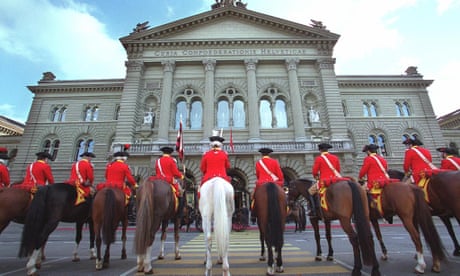Leave won because too many British voters identified the EU with authoritarianism, irrationality and contempt for parliamentary democracy while too few believed those of us who claimed that another EU was possible.
I campaigned for a radical remain vote reflecting the values of our pan-European Democracy in Europe Movement (DiEM25). I visited towns in England, Wales, Scotland and Northern Ireland, seeking to convince progressives that dissolving the EU was not the solution. I argued that its disintegration would unleash deflationary forces of the type that predictably tighten the screws of austerity everywhere and end up favouring the establishment and its xenophobic sidekicks. Alongside John McDonnell, Caroline Lucas, Owen Jones, Paul Mason and others, I argued for a strategy of remaining in but against Europe’s established order and institutions.
Against us was an alliance of David Cameron (whose Brussels’ fudge reminded Britons of what they despise about the EU), the Treasury (and its ludicrous pseudo-econometric scare-mongering), the City (whose insufferable self-absorbed arrogance put millions of voters off the EU), Brussels (busily applying its latest treatment of fiscal waterboarding to the European periphery), Germany’s finance minister Wolfgang Schäuble (whose threats against British voters galvanised anti-German sentiment), France’s pitiable socialist government, Hillary Clinton and her merry Atlanticists (portraying the EU as part of another dangerous “coalition of the willing") and the Greek government (whose permanent surrender to punitive EU austerity made it so hard to convince the British working class that their rights were protected by Brussels).
The repercussions of the vote will be dire, albeit not the ones Cameron and Brussels had warned of. The markets will soon settle down, and negotiations will probably lead to something like a Norwegian solution that allows the next British parliament to carve out a path toward some mutually agreed arrangement. Schäuble and Brussels will huff and puff but they will, inevitably, seek such a settlement with London. The Tories will hang together, as they always do, guided by their powerful instinct of class interest. However, despite the relative tranquillity that will follow on from the current shock, insidious forces will be activated under the surface with a terrible capacity for inflicting damage on Europe and on Britain.
Italy, Finland, Spain, France, and certainly Greece, are unsustainable under the present arrangements. The architecture of the euro is a guarantee of stagnation and is deepening the debt-deflationary spiral that strengthens the xenophobic right. Populists in Italy and Finland, possibly in France, will demand referendums or other ways to disengage.
The repercussions of the vote will be dire, albeit not the ones Cameron and Brussels had warned of. The markets will soon settle down, and negotiations will probably lead to something like a Norwegian solution that allows the next British parliament to carve out a path toward some mutually agreed arrangement. Schäuble and Brussels will huff and puff but they will, inevitably, seek such a settlement with London. The Tories will hang together, as they always do, guided by their powerful instinct of class interest. However, despite the relative tranquillity that will follow on from the current shock, insidious forces will be activated under the surface with a terrible capacity for inflicting damage on Europe and on Britain.
Italy, Finland, Spain, France, and certainly Greece, are unsustainable under the present arrangements. The architecture of the euro is a guarantee of stagnation and is deepening the debt-deflationary spiral that strengthens the xenophobic right. Populists in Italy and Finland, possibly in France, will demand referendums or other ways to disengage.

‘The markets will soon settle down, and negotiations will probably lead to something like a Norwegian solution that allows the next British parliament to carve out a path toward some mutually agreed arrangement.’ Photograph: Leon Neal/AFP/Getty Images
The only man with a plan is Germany’s finance minister. Schäuble recognises in the post-Brexit fear his great opportunity to implement a permanent austerity union. Under his plan, eurozone states will be offered some carrots and a huge stick. The carrots will come in the form of a small eurozone budget to cover, in some part, unemployment benefits and bank deposit insurance. The stick will be a veto over national budgets.
If I am right, and Brexit leads to the construction of a permanent austerian iron cage for the remaining EU member states, there are two possible outcomes: One is that the cage will hold, in which case the institutionalised austerity will export deflation to Britain but also to China (whose further destabilisation will have secondary negative effects on Britain and the EU).
Another possibility is that the cage will be breached (by Italy or Finland leaving, for instance), the result being Germany’s own departure from the collapsing eurozone. But this will turn the new Deutschmark zone, which will probably end at the Ukrainian border, into a huge engine of deflation (as the new currency goes through the roof and German factories lose international markets). Britain and China had better brace themselves for an even greater deflation shock wave under this scenario.
The horror of these developments, from which Britain cannot be shielded by Brexit, is the main reason why I, and other members of DiEM25, tried to save the EU from the establishment that is driving Europeanism into the ground. I very much doubt that, despite their panic in Brexit’s aftermath, EU leaders will learn their lesson. They will continue to throttle voices calling for the EU’s democratisation and they will continue to rule through fear. Is it any wonder that many progressive Britons turned their back on this EU?

EU referendum full results – find out how your area voted
While I remain convinced that leave was the wrong choice, I welcome the British people’s determination to tackle the diminution of democratic sovereignty caused by the democratic deficit in the EU. And I refuse to be downcast, even though I count myself on the losing side of the referendum.
As of today, British and European democrats must seize on this vote to confront the establishment in London and Brussels more powerfully than before. The EU’s disintegration is now running at full speed. Building bridges across Europe, bringing democrats together across borders and political parties, is what Europe needs more than ever to avoid a slide into a xenophobic, deflationary, 1930s-like abyss.
